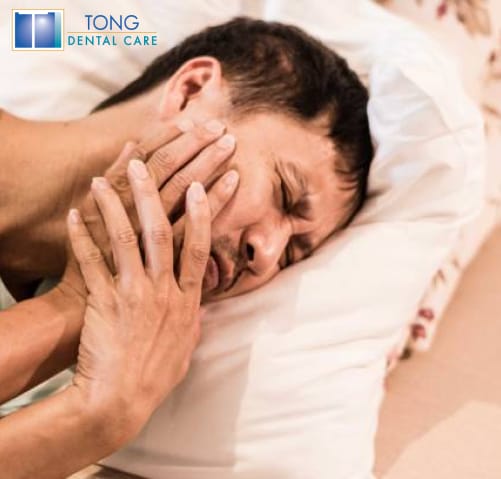Tong Dental Care – Germantown, MD
TMJ Treatment in Germantown, MD
When it comes to dental crowns and bridges in Germantown, MD, Tong Dental Care offers expert solutions to restore your smile’s function and aesthetics. Our customized approach makes sure that each restoration is tailored to meet your specific dental needs.
Discover how our advanced techniques and materials can help you achieve a healthier, more confident smile.

What is TMJ Disorder?
TMJ disorder is the temporomandibular joint that connects your jawbone to your skull and causes pain and discomfort in many daily activities.
The temporomandibular joint is a hinge that allows for a lot of movement, up, down, and side to side. This joint is used for speaking, chewing, and even yawning. When there’s an issue in this joint, whether it’s inflammation, misalignment, or stress, it can cause a lot of pain.
Symptoms of TMJ disorder include persistent jaw pain, frequent headaches, difficulty chewing, and clicking or popping sounds when moving the jaw. Many patients also experience earaches and facial fatigue.
Addressing TMJ issues early is important because leaving it untreated can cause more serious complications. Chronic jaw pain and dysfunction can cause long-term effects on your oral health, such as tooth wear, bite misalignment, and muscle tension. TMJ disorder can also affect your quality of life, making even simple tasks like eating and talking uncomfortable.

What Causes TMJ Disorders?
Knowing the causes will help you stop the discomfort and choose the right treatment.
One of the most common causes of TMJ disorders is bruxism, or teeth grinding, which happens unconsciously during sleep. Stress-related jaw clenching can also put too much pressure on the temporomandibular joint and, over time, cause inflammation and pain.
Misaligned teeth or an improper bite is another common culprit. When the upper and lower teeth don’t align properly it can strain the jaw muscles and joints and cause discomfort or dysfunction in the TMJ.
Arthritis and other joint-related conditions, such as osteoarthritis or rheumatoid arthritis, can also affect the temporomandibular joint. These conditions can cause the cartilage to wear down or become inflamed, causing stiffness, pain, and limited movement.
Injuries to the jaw or face, like trauma from an accident or impact, can directly damage the TMJ or surrounding muscles and ligaments and often cause long-term problems.
Other factors include genetics and certain anatomical traits that can predispose people to TMJ disorders. Knowing these causes will help you choose the right treatment and manage your symptoms.

TMJ Symptoms
If you are experiencing any of these symptoms, it’s time to get TMJ treatment.
One of the most common symptoms of TMJ disorder is pain or tenderness in the jaw, which can be on one side or both sides of the face. This can radiate to other areas, including the ear, even though the problem is in the jaw joint.
Many patients with TMJ disorder also report difficulty chewing or discomfort while eating. Simple actions like biting or chewing can be painful or feel unnatural.
A more serious symptom is jaw locking, making it hard to open or close your mouth. This locking sensation can be scary and disrupt daily activities like speaking or eating.
Also, chronic headaches and facial pain are common with TMJ disorder. These headaches are often mistaken for migraines or other types of tension headaches but can be related to jaw dysfunction. Addressing these symptoms early on is key to preventing long-term discomfort and finding relief.
How Tong Dental Care Treats TMJ Disorders
Custom Mouthguards and Splints: These devices are designed to relieve pressure on the temporomandibular joint and protect against teeth grinding and clenching. They help reduce stress on the jaw, preventing further damage and relieving pain.
Occlusal Adjustments: Adjusting the alignment of your bite can reduce strain on the jaw and promote more even pressure distribution across the teeth, which helps alleviate discomfort and prevents future joint issues.
Physical Therapy and Jaw Exercises: Non-invasive methods, such as targeted exercises and physical therapy, help strengthen the muscles around the temporomandibular joint. These techniques improve jaw function and reduce stiffness or discomfort.
Medications: In some cases, anti-inflammatory medications or muscle relaxants are prescribed to ease pain and reduce inflammation in the joint. These options help relieve discomfort and improve overall jaw mobility.
Take Control of Your TMJ Pain Today
Living with TMJ disorder can significantly impact your quality of life, but relief is possible with the right treatment. At Tong Dental Care, we are committed to helping you overcome your TMJ symptoms with personalized care plans tailored to your needs. Whether you require a custom mouthguard, physical therapy, or other treatment options, our team is here to support you every step of the way.
Contact us today and take the first step toward a pain-free, healthier smile with our TMJ treatment in Germantown, MD.
